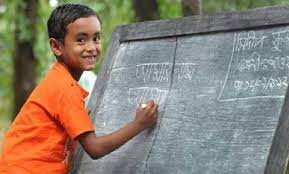United Nations Educational,
.jpeg)
United Nations Educational, Scientific and Cultural Organization-UNESCO, which looks forward to achieving the success of Bangladesh for achieving the goals of education (EFA) for all, can be an example of Bangladesh's success. In the 196th meeting of the Executive Board of UNESCO in Paris on April 14, the agency gave this opinion.
UNESCO released a report titled 'Education for All 2000-2015: Achievements and Challenges' this month. It has been made under the UNESCO Education for All (EFA) Global Monitoring Program.
In this report, Bangladesh's education program is said, "Bangladesh is one of the few countries that has given importance to education in the national budget, despite the low income, few countries have given importance to education in the national budget. To achieve the goal of ensuring education for all, primary education in Bangladesh as well as pre-primary education is being given importance. "
It further states, "In 1999, where pre-primary education was 18 percent, it stood at 26 percent in 2012. The pre-primary education rate has increased in both rural and urban areas. This level of education has progressed further. "
Citing a survey on education of the government of Bangladesh, the report said that 50 percent of adult women in the country and 57 percent of the men were educated. 36% of the qualified qualified women qualified for life and 44% of the male. They are able to write, read, and perform mathematical reasoning with the skills necessary for work, and they are able to develop this skill in the future.
The meeting of UNESCO Executive Board on 14 April also discussed Bangladesh's success in the education sector. During this time, the Director General reiterated Bangladesh's success in achieving United Nations Millennium Development Goal (MDG) and EFA targets by 2015.
"Many countries are lagging behind in achieving the goal. Bangladesh is moving forward in education sector to achieve pre-determined goals due to the political will and commitment of the current government, "UNESCO Director General Irina Bokova said on 16 April, according to the Bangladesh Sangbad Sangstha-BSS.
UNESCO says primary education (Primary Adjusted Net Enrollment Rate) has achieved about 96 percent of the target.
The current session of the UNESCO executive board begins on April 13, till 23 April. Kamal Abdul Naser Chowdhury is representing Bangladesh in the UNESCO Executive Board's Session.
"We felt very proud to discuss the success of achieving Bangladesh's success in the international forum." UNESCO thinks Bangladesh will be able to achieve EFA targets, "said Bennar to the telephone. Kamal Abdul Naser Chowdhury, who was now Secretary of the Public Administration Ministry, was earlier educated secretary.
In Paris this new draft of education for everyone is being done. It will be evaluated to achieve the previous goal this year. The new target and destination is now 2030.
Rasheda K. Chowdhury, executive director of the public and public education campaign for the former caretaker government who returned to Dhaka in Paris, participated in the conference, said on 17 April, "The conference discussed the way to bring the children back to education."
"UNESCO has calculated that the children of the world who are still out of education will need 22 billion US dollars, which cost only four days of military expenditures in the world. But this money has not been collected, which is very shame," said Rasheda K. Chowdhury.
In a conference held in Paris, Mrs Rasheda said that the special program 'Food for All' has been successful in the neighboring country. India has managed to bring 12 million or 120 million children under this program.
Rasheda K. Chowdhury said about the topic of discussion in Bangladesh, "One episode of education is going to end in 2015. So there is no new acquisition in recent time. But there are continuation of previous achievements. "
Which aspect of education has been discussed around the world? - The NGO personality of Bangladesh, working in education, says, "Education discrimination around the world is on the rise. Besides, the quality of education is not rising. But the rate of education is increasing. These were the discussions on the horizon. "
In the capital of Dakar, Senegal, 164 countries have pledged to ensure education for all, their latest situation, current issues and future development have been ordered to do.
Regarding primary education, it is said that children who did not attend school in Bangladesh in 2000 were 20 percent. By 2010, the number has decreased by more than half. The rate of interest in schoolgirls has increased significantly due to ivory. The school's food program also played a role in this.
"We still have to go ahead. We are giving books to all the children of the country. Increasing use of information technology. We have our own strengths, but fewer possible. Education Minister Nurul Islam Nahid told Bennar that the money should be allocated as a developing country.
However, Rasheda K. Chowdhury said, "Any way to increase education allocation will be increased. Now 2.3 percent of the national income of education is allocated. If you want to get quality education, it will take six percent. "
✅ Enjoy the vote! For more amazing content, please follow @themadcurator for a chance to receive more free votes!